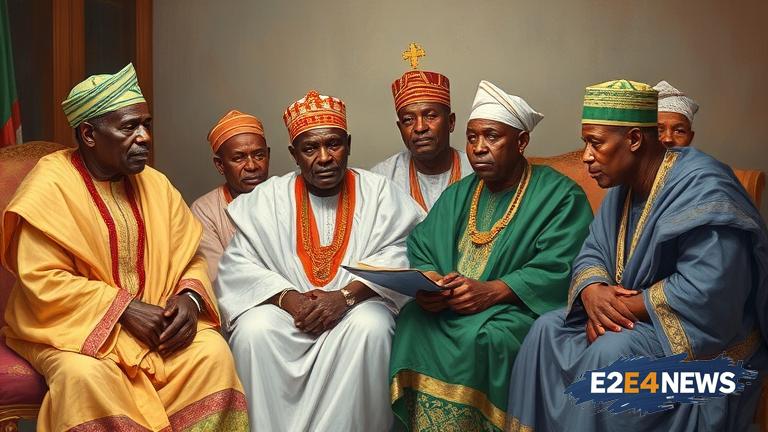In a recent development, traditional rulers in Lagos, Nigeria, have made a formal request to the government, demanding a 5% allowance from the local government allocation. This move is aimed at addressing the financial struggles faced by these traditional leaders, who play a vital role in maintaining cultural heritage and social cohesion in their respective communities. The traditional rulers, who are also known as obas, have been facing significant financial challenges, which have hindered their ability to perform their duties effectively. Despite their importance in Nigerian society, these traditional leaders have been struggling to make ends meet, with many relying on meager allowances and handouts from the government. The demand for a 5% allowance is seen as a necessary step to ensure that these traditional rulers can continue to fulfill their roles without financial burdens. The traditional rulers have argued that the current allocation is insufficient, given the rising cost of living and the increasing demands on their resources. They have also pointed out that other states in Nigeria have already implemented similar allowances, and it is only fair that Lagos follows suit. The Lagos State Government has been urged to consider the request, taking into account the significant contributions that traditional rulers make to the state’s cultural and social fabric. The traditional rulers have threatened to embark on a protest if their demands are not met, which could potentially disrupt social services and create tension in the community. The government has been advised to engage in dialogue with the traditional rulers to find a mutually beneficial solution. The demand for increased allowance has sparked a debate about the role of traditional rulers in modern Nigerian society and the need for greater support and recognition. Many have argued that traditional rulers are an essential part of Nigerian culture and identity, and their contributions should be valued and respected. Others have pointed out that the demand for increased allowance is not only about financial support but also about recognizing the importance of traditional institutions in maintaining social cohesion and stability. The Lagos State Government has been called upon to prioritize the welfare of traditional rulers, given their significant contributions to the state’s development. The government has been urged to consider the long-term benefits of supporting traditional rulers, including the promotion of cultural heritage and the preservation of traditional values. The traditional rulers have also argued that the increased allowance will enable them to better serve their communities, including providing support for education, healthcare, and other social services. The demand for increased allowance has also highlighted the need for greater transparency and accountability in the allocation of government funds. Many have called for a review of the current allocation system, to ensure that funds are being used effectively and efficiently. The Lagos State Government has been advised to engage in a thorough review of the allocation system, to identify areas where funds can be better utilized. The traditional rulers have also pointed out that the increased allowance will enable them to play a more active role in promoting economic development and job creation in their communities. The demand for increased allowance has sparked a wider debate about the role of traditional institutions in promoting economic growth and development. Many have argued that traditional rulers have a critical role to play in promoting entrepreneurship, innovation, and job creation, and their contributions should be recognized and supported. The Lagos State Government has been urged to consider the potential benefits of supporting traditional rulers, including the promotion of economic growth and development. The traditional rulers have also argued that the increased allowance will enable them to better respond to the needs of their communities, including providing support for vulnerable groups such as women, children, and the elderly. The demand for increased allowance has highlighted the need for greater recognition and support for traditional rulers, given their significant contributions to Nigerian society.
